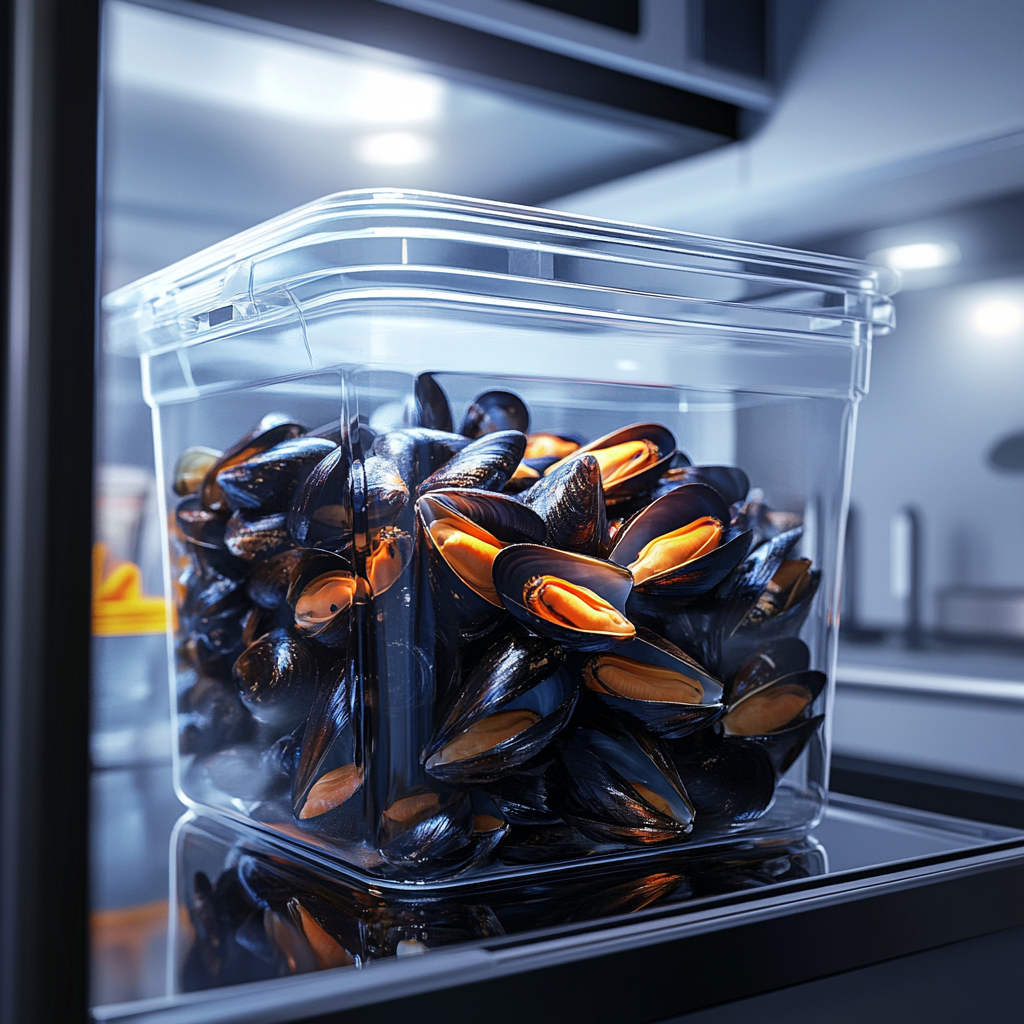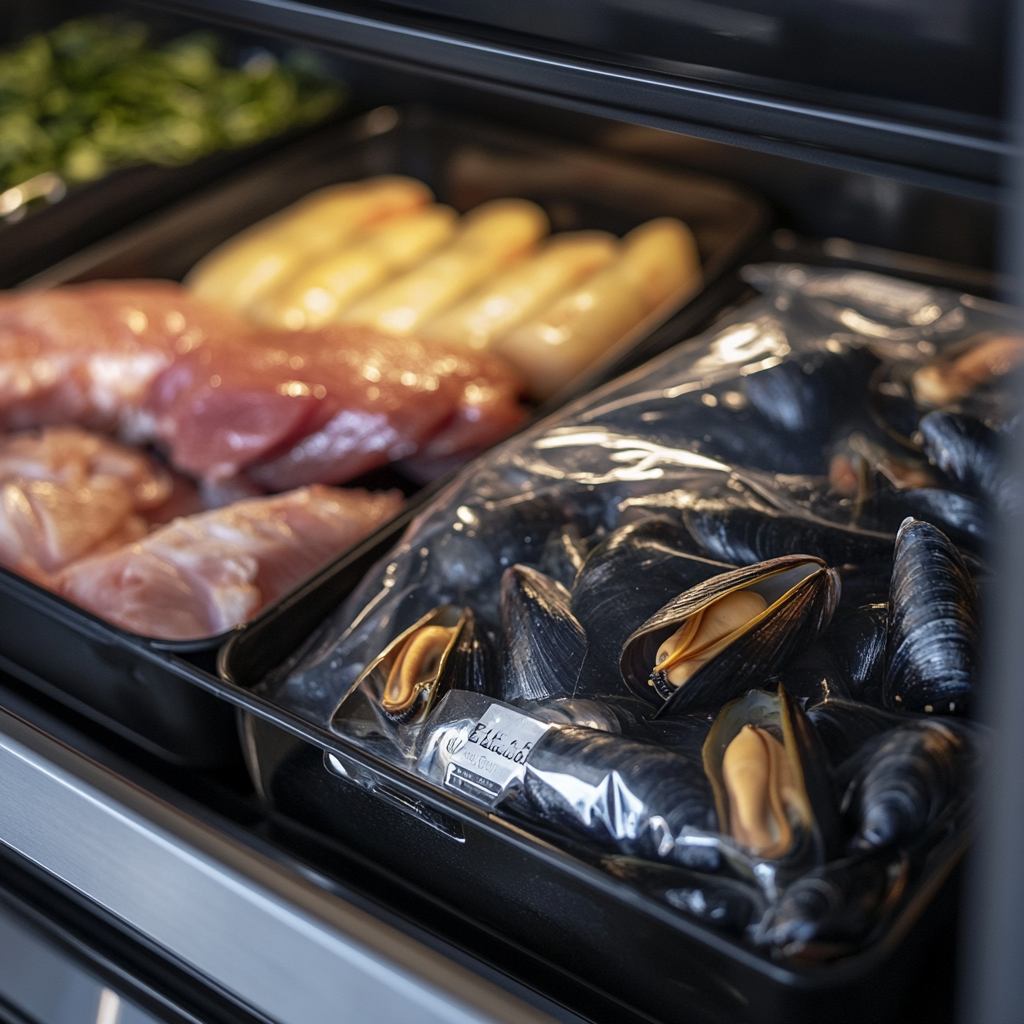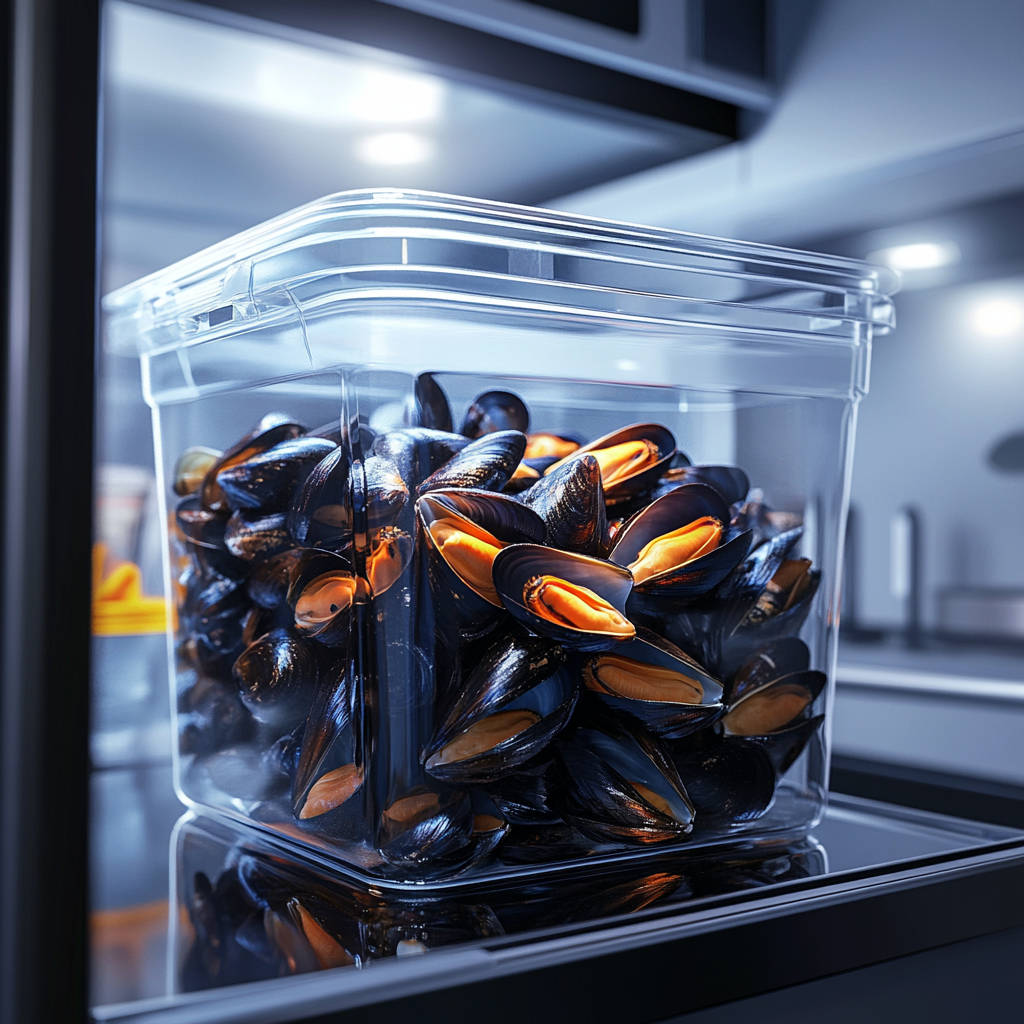Introduction
Can I Store Leftover Mussels? Mussels are a delicious and versatile seafood dish, but what happens when you have leftovers? Can you store leftover mussels safely, and how long will they last?
Proper storage is essential to ensure food safety, freshness, and flavor. Since seafood is highly perishable, mussels must be stored correctly to avoid spoilage and foodborne illnesses.https://peimussel.com/how-to-store
Why Proper Mussel Storage Matters
✔ Prevents Bacterial Growth – Cooked mussels must be stored at the right temperature to avoid contamination.
✔ Maintains Freshness & Texture – Improper storage can make mussels rubbery and dry when reheated.
✔ Reduces Food Waste – Storing mussels correctly allows you to enjoy them later without throwing them away.
In this guide, we’ll cover how to store leftover mussels, the best ways to reheat them, and common mistakes to avoid when keeping mussels for later.
How Long Do Cooked Mussels Last?
Mussels are highly perishable, and their shelf life depends on how they are stored. To ensure safety and freshness, it’s important to follow proper storage guidelines.
1. Storing Cooked Mussels in the Refrigerator

✅ Best if eaten within 1-2 days
✅ Store at a temperature of 40°F (4°C) or lower
✅ Keep mussels in a sealed container with some broth to retain moisture
Pro Tip: The sooner you eat them, the better! Even though they can last up to 48 hours, mussels taste best when eaten within 24 hours.
2. Can You Freeze Cooked Mussels?
✅ Yes, but with some limitations
✅ Freezing mussels can alter their texture, making them slightly tougher when reheated
✅ Store in an airtight, freezer-safe container with some broth to prevent drying out
| Storage Method | Recommended Time | Best For |
|---|---|---|
| Refrigerator (40°F or lower) | 1-2 days | Best for freshness |
| Freezer (0°F or lower) | Up to 3 months | Longer-term storage but texture changes |
Never leave cooked mussels at room temperature for more than 2 hours! Bacteria grow rapidly at temperatures between 40°F and 140°F, making them unsafe to eat.
Now that we know how long mussels last, let’s go over the best storage methods to keep them fresh.
Best Ways to Store Leftover Mussels
Proper storage ensures that leftover mussels remain safe to eat, flavorful, and moist. Below are the best ways to store cooked mussels in the refrigerator or freezer.
1. Storing Cooked Mussels in the Refrigerator
Follow these steps to keep mussels fresh in the fridge for up to 2 days:
1️⃣ Let them cool – Allow mussels to reach room temperature before storing, but don’t leave them out for more than 2 hours.
2️⃣ Use an airtight container – Store mussels in a shallow, covered dish or airtight container.
3️⃣ Add some broth – Pour a small amount of the cooking broth or sauce over them to retain moisture and prevent drying out.
4️⃣ Refrigerate immediately – Place them in the fridge at 40°F (4°C) or lower.
Avoid storing mussels in plastic bags or wrapping them in foil—this traps moisture and encourages bacterial growth.
2. Freezing Cooked Mussels
If you’re not planning to eat your mussels within 2 days, freezing is an option. However, freezing can change their texture, making them slightly chewier when reheated.
How to Freeze Cooked Mussels:
1️⃣ Remove the shells – While you can freeze mussels with the shells on, removing the shells makes storage more efficient.
2️⃣ Store in a freezer-safe container – Place mussels in an airtight plastic container or heavy-duty freezer bag.
3️⃣ Add broth or sauce – This helps prevent freezer burn and keeps them moist.
4️⃣ Label with the date – Mussels can last up to 3 months in the freezer.
3. Should You Store Mussels With or Without Shells?
✅ Without shells – Easier to store, reheat, and use in future recipes.
✅ With shells – Helps retain moisture, but takes up more space.
How to Thaw Frozen Mussels

For the best results, thaw frozen mussels in the refrigerator overnight before reheating. Avoid microwaving them directly from frozen, as this can make them rubbery.
Now that your mussels are properly stored, let’s go over how to reheat them without losing flavor and texture.
How to Reheat Leftover Mussels Properly
Reheating mussels the wrong way can make them tough, rubbery, or dry. To keep them juicy and flavorful, it’s essential to use the right reheating method.
Best Ways to Reheat Cooked Mussels
1. Reheating Mussels on the Stovetop (Best Method)
✔ Retains moisture and flavor
✔ Quick and easy
Steps:
1️⃣ Place mussels in a saucepan or skillet over medium-low heat.
2️⃣ Add a small amount of broth, butter, or white wine to keep them from drying out.
3️⃣ Cover with a lid and heat for 3-5 minutes, stirring occasionally.
4️⃣ Once warmed through, remove from heat and serve immediately.
Do NOT overcook! Reheating for too long will make mussels tough and chewy.
2. Reheating Mussels in the Oven
✔ Best for reheating mussels in sauce
✔ Even heating
Steps:
1️⃣ Preheat oven to 350°F (175°C).
2️⃣ Place mussels in an oven-safe dish and add a bit of broth or sauce.
3️⃣ Cover with foil to trap steam.
4️⃣ Heat for 10-15 minutes until warmed through.
3. Reheating Mussels in the Microwave (Not Recommended)
Mussels tend to become rubbery in the microwave.
✅ If using a microwave, follow these tips:
- Place mussels in a microwave-safe dish with some liquid (broth or sauce).
- Cover with a damp paper towel.
- Heat in short bursts (30 seconds at a time) until just warm.
What to Avoid When Reheating Mussels
Boiling or steaming again – This overcooks the mussels and makes them tough.
Microwaving for too long – Heat gently to prevent drying out.
Reheating more than once – Only reheat mussels one time for food safety.
With the right reheating method, your mussels will stay tender and delicious! Up next, let’s go over common mistakes to avoid when storing mussels.
Common Mistakes to Avoid When Storing Mussels
Storing mussels improperly can lead to spoilage, foodborne illness, and loss of flavor. Avoid these common mistakes to ensure your mussels stay fresh and safe to eat.
1. Not Cooling Mussels Quickly Enough
Mistake: Leaving mussels at room temperature for too long.
✅ Fix: Cool mussels to room temperature within 30 minutes and refrigerate them within 2 hours of cooking.
2. Storing Mussels in an Airtight Container Without Liquid
Mistake: Storing mussels in a completely dry airtight container can make them dry out.
✅ Fix: Add a small amount of broth, sauce, or butter to keep them moist.
3. Keeping Cooked Mussels in Plastic Bags or Aluminum Foil
Mistake: Wrapping mussels in plastic wrap or foil can trap bacteria.
✅ Fix: Always use a sealed glass or plastic container with a lid.
4. Freezing Mussels Without Removing the Shells
Mistake: Freezing mussels in their shells takes up extra space and can cause freezer burn.
✅ Fix: Remove mussels from their shells before freezing for easier storage and reheating.
5. Reheating Mussels the Wrong Way
Mistake: Overcooking mussels when reheating, making them tough and rubbery.
✅ Fix: Reheat gently using a stovetop or oven with a bit of liquid to keep them tender.
6. Keeping Leftover Mussels for Too Long
Mistake: Eating mussels after 3-4 days in the fridge, increasing the risk of food poisoning.
✅ Fix: Eat within 1-2 days for the best taste and safety.
How Do You Know If Stored Mussels Have Gone Bad?
Signs of spoiled mussels include:
- Strong, fishy smell (fresh mussels should have a mild ocean scent).
- Slimy or mushy texture (indicates spoilage).
- Discolored meat (mussels should be white, beige, or orange).
If mussels show any of these signs, discard them immediately.
By avoiding these mistakes, you can safely store mussels and enjoy them without losing their flavor or risking foodborne illness.
Frequently Asked Questions About Storing Leftover Mussels
Many people wonder about the best way to store and reheat mussels while keeping them safe and flavorful. Here are answers to the most common questions about leftover mussels.
1. Can I Eat Cooked Mussels the Next Day?
✅ Yes! Cooked mussels can be stored in the refrigerator for up to 2 days.
Avoid eating mussels that have been left at room temperature for more than 2 hours.
2. Can I Freeze Leftover Mussels?
✅ Yes, but expect some texture changes. Frozen mussels can last up to 3 months.
Avoid freezing mussels in their shells—remove the meat before freezing for better results.
3. How Do I Know If My Stored Mussels Have Gone Bad?
Signs of spoiled mussels include:
- A strong, unpleasant fishy odor
- A slimy or mushy texture
- Discoloration of the mussel meat
If mussels show any of these signs, discard them immediately.
4. What Is the Best Way to Reheat Leftover Mussels?
✅ The best way is to reheat them on the stovetop with some broth or sauce for 3-5 minutes.
Avoid microwaving for too long—this can make them rubbery and dry.
5. Can I Store Leftover Mussels in Their Cooking Sauce?
✅ Yes! Keeping mussels in their cooking broth or sauce helps maintain moisture and flavor.
6. Is It Safe to Eat Cold Cooked Mussels?
✅ Yes, as long as they have been properly stored in the fridge. Cold mussels can be used in salads, seafood pasta, or ceviche-style dishes.
By following these guidelines, you can safely store, freeze, and reheat mussels without losing their quality.
Conclusion
Storing leftover mussels correctly ensures they remain safe, flavorful, and enjoyable for later meals. Whether you refrigerate or freeze them, following the right storage methods helps prevent food waste and maintain their texture.https://royalesrecipes.com/flex-mussels-recipe/
Key Takeaways:
✔ Refrigerate cooked mussels within 2 hours and eat them within 1-2 days for best freshness.
✔ Freeze mussels for up to 3 months, but expect a slight texture change.
✔ Store mussels with some broth or sauce to keep them moist.
✔ Reheat mussels gently on the stovetop or in the oven to avoid overcooking.
✔ Check for signs of spoilage (bad smell, slimy texture, or discoloration) before eating.
By following these storage and reheating tips, you can enjoy your leftover mussels safely while maintaining their delicious taste and tender texture.

